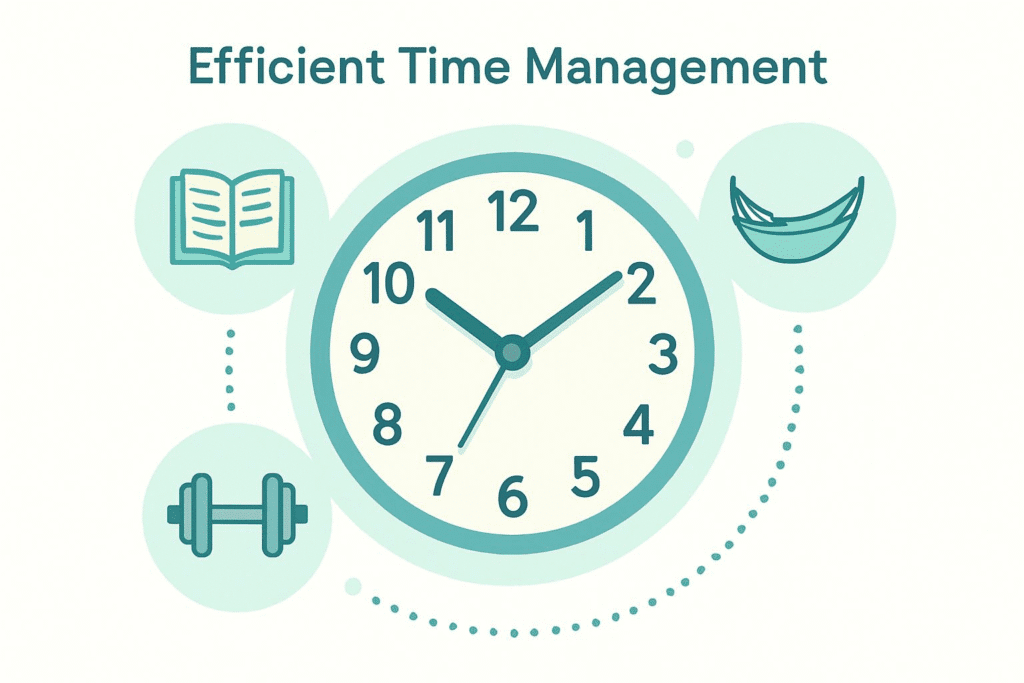Introduction

Being a student isn’t just about lectures, textbooks, and chasing deadlines—it’s a whirlwind of personal growth, decision-making, and discovering who you really are. In the midst of all this, many students unknowingly fall into the trap of surviving rather than thriving. But what if the secret to excelling academically wasn’t just about studying harder, but about living smarter?
Imagine approaching your student life not as a struggle, but as an opportunity to design a lifestyle that energizes you, sharpens your focus, and makes every day feel purposeful. This isn’t about overnight transformations or rigid routines—it’s about intentional living that balances your body, mind, and time.
A truly empowered student lifestyle weaves together four key threads: physical vitality, mental clarity, time wisdom, and meaningful social connections. When these elements come together, the impact is profound—less stress, more motivation, and a deeper sense of fulfillment both inside and outside the classroom.
In this blog, we’re going beyond the generic advice. You’ll explore real-world strategies and fresh insights that many students overlook—from clever time-hacking habits to simple mindset shifts that can reboot your productivity. Whether you’re just starting your academic journey or looking to elevate your current routine, this guide is designed to help you create a lifestyle that doesn’t just support your goals—it fuels them.
Let’s reimagine student life together—not as a challenge to endure, but as a powerful launchpad for your future.
Physical Wellness: A Foundation for Success

Let’s face it—no amount of late-night cramming or caffeine-fueled study sessions can make up for a neglected body. Physical wellness isn’t just a bonus in student life; it’s the engine that drives your focus, stamina, and emotional balance. When your body is thriving, your mind follows—and that’s when real academic magic happens.
Here’s how you can transform your physical health from an afterthought into a power tool for success:
Eat with Intention, Not Just Convenience
In the rush of back-to-back lectures and assignment deadlines, eating often becomes an act of survival. But what if you treated food like fuel for greatness?
A plate rich in vibrant veggies, lean proteins, whole grains, and good fats doesn’t just satisfy hunger—it boosts cognitive function, sharpens memory, and keeps your energy stable throughout the day. Think of your meals as building blocks for brain power.
Try this:
- Batch-prep simple, vibrant meals like quinoa bowls, veggie wraps, or overnight oats.
- Keep smart snacks on standby: almonds, boiled eggs, Greek yogurt, or fruit.
- Hydrate often—water is a brain’s best friend, while sugary drinks are a mental fog in disguise.
Move Like It Matters—Because It Does
Exercise is often seen as optional, but for students, it’s non-negotiable if you want to stay sharp, stress-resilient, and emotionally grounded. Physical activity releases endorphins—natural mood elevators that can combat academic anxiety better than any motivational quote.
And no, you don’t need a gym membership or fancy gear. Movement in any form counts.
Try this:
- Squeeze in 30 minutes of activity you genuinely enjoy—brisk walking, dancing, swimming, or even a home workout video.
- Use movement as study breaks. Ten-minute yoga flows between chapters can do wonders.
- Make it social—join a campus running group or challenge a friend to daily step goals.
Sleep Like a Scholar, Not a Zombie
In the student world, sleep often gets sacrificed on the altar of “productivity.” But here’s the truth: chronic sleep deprivation makes your brain sluggish, your emotions unstable, and your memory unreliable. Quality sleep is the hidden productivity hack no one’s talking about.
Try this:
- Stick to a consistent sleep schedule—even on weekends.
- Turn your room into a sleep sanctuary: dim lights, no devices, maybe a bit of lavender oil or calming music.
- Ditch the late-night scroll—blue light is the enemy of deep rest.
Physical wellness isn’t about perfection—it’s about being kind to your body so it can show up for you when it counts. When you eat to nourish, move to feel alive, and rest to reset, you’re not just surviving student life—you’re mastering it.
Mental and Emotional Well-being

Academic pressure, social expectations, personal goals—student life can feel like juggling fire while walking a tightrope. But here’s the truth no one talks about enough: your mental and emotional well-being is just as important as your GPA. Without inner balance, even the most brilliant students can lose direction.
So how do you build a strong, stable emotional foundation when life is moving at full speed? It starts with small, intentional habits that help you regulate stress, protect your energy, and find joy in the journey.
🧠 Master the Art of Stress Before It Masters You
Stress is part of the student package—but chronic, unmanaged stress? That’s a silent productivity killer. The good news? You don’t have to be a meditation guru to find peace amid chaos.
Try this:
- Pause for five minutes each day to just breathe—deep, slow, and conscious. You’d be surprised how much tension melts away when you reconnect with the present moment.
- Journal like nobody’s reading. Dump your thoughts, your worries, your dreams. It clears mental clutter and gives you clarity.
- Break the “mountain” into “molehills.” Big projects feel more doable when you divide them into bite-sized actions.
- And remember: reaching out for help doesn’t mean weakness—it shows strength. Most campuses offer free or low-cost mental health support. Use it.
🌞 Rewire Your Mindset: The Quiet Power of Positivity
Staying positive doesn’t mean ignoring challenges—it means choosing to face them with resilience and hope. A growth-oriented mindset can change how you respond to setbacks, relationships, and even your own self-talk.
Try this:
- Begin or end your day with gratitude. Write down three things—big or small—you’re thankful for. It shifts your focus from pressure to perspective.
- Practice affirmations like “I am capable,” “I learn from mistakes,” or “I deserve balance.” Say them out loud or keep them on sticky notes near your workspace.
- Hang out with people who pour energy into you—not drain it. The right support system can uplift you during even the darkest semesters.
🛋️ Protect Your Peace: Make Space for Yourself
In a world that glorifies hustle, taking time for yourself is a radical act of self-respect. Downtime isn’t laziness—it’s necessary maintenance for your mind and emotions.
Try this:
- Do more of what lights you up—whether it’s painting, hiking, baking, or binge-watching comfort shows guilt-free.
- Say no when needed. Boundaries aren’t barriers—they’re bridges to better self-care.
- Celebrate the small stuff. Finished that annoying assignment? Take a walk, treat yourself to coffee, or text a friend just to share the win.
Prioritizing your mental and emotional wellness isn’t selfish—it’s smart. When your inner world is calm and strong, every aspect of student life becomes more manageable, more meaningful, and far more rewarding. You don’t just study better—you live better.
Time Is Your Superpower: Mastering Time Management as a Student

If you’ve ever found yourself wondering “Where did my day go?”, you’re not alone. In student life, time often slips through your fingers—lost between lectures, group chats, half-finished assignments, and the occasional doom scroll. But here’s the empowering truth: when you learn to manage your time intentionally, you gain control over your day—and your future.
Time management isn’t about squeezing productivity out of every second. It’s about creating space: space for learning, space for rest, and space for the things that make you feel alive.
Let’s explore how you can make time your ally instead of your enemy.
📅 Plan with Purpose: Build a Schedule That Works for You
A schedule isn’t a cage—it’s a compass. When done right, it frees your mind from the stress of “What should I be doing right now?” and lets you focus on doing.
Try this:
- Use digital tools like Google Calendar, Notion, or TickTick to visually map your days.
- Time-block your day into focus zones (study), refresh zones (breaks), and joy zones (hobbies or social time).
- Don’t just schedule tasks—schedule breathing space. Life isn’t always predictable, and your calendar should be flexible enough to adapt.
Think of your schedule as a living document—revise it weekly based on what’s working and what’s draining you.
🧩 Shrink the Mountain: Break It Down, Get It Done
Ever stared at a massive project and instantly felt paralyzed? That’s your brain waving a white flag. But when you chunk big tasks into smaller, doable pieces, momentum starts to build—and anxiety begins to fade.
Try this:
- Break assignments into micro-goals: “research topic,” “outline intro,” “draft paragraph 1,” and so on.
- Use the Pomodoro Technique—25 minutes of focused work, followed by a 5-minute break. After four rounds, take a longer pause. It’s focus, without burnout.
- Prioritize using the Eisenhower Matrix: What’s urgent? What’s important? Not everything is both.
Small wins lead to big progress. Every task you check off adds confidence and clarity.
🚫 Focus Mode: Say No to Distractions (Even the Sneaky Ones)
Your phone, your notifications, your endlessly refreshing inbox—they’re all silently robbing your time. To truly own your day, you have to protect your focus like it’s sacred—because it is.
Try this:
- Designate a distraction-free zone for studying. A clean desk and a quiet spot can work wonders for your concentration.
- Use tools like Forest, Focusmate, or Cold Turkey to keep your attention where it belongs.
- Mute non-essential notifications or use Do Not Disturb mode during study blocks. The group chat can wait—your future can’t.
Time is your most precious non-renewable resource. When you learn how to spend it wisely, you stop chasing your day—and start leading it. With intentional planning, focused action, and a little self-discipline, you’ll not only get more done—you’ll actually enjoy the process.
The Power of Connection: Why Social Well-Being Is a Game Changer for Students

In a world obsessed with grades, deadlines, and competition, it’s easy to forget that we’re not machines—we’re human. And humans thrive on connection. While academic success may be the headline goal for many students, strong relationships are what keep the story meaningful. Your social life isn’t a distraction from success—it’s part of the foundation.
Whether you’re an introvert who values deep one-on-one conversations or someone who thrives in buzzing social circles, investing in relationships is an investment in your mental health, resilience, and long-term growth.
Let’s explore how to make your social circle one of your strongest sources of support during your academic journey.
🤝 Build Friendships That Nourish, Not Drain
Not all friendships are created equal. Some lift you up, while others leave you feeling drained. Real friendship isn’t just about sharing memes or hanging out during breaks—it’s about emotional safety, trust, and having someone in your corner when things get tough.
Try this:
- Seek out people who share your values, not just your schedule. Conversations rooted in authenticity build stronger bonds than surface-level interactions.
- Be present when you’re with friends—listen deeply, ask questions, and show up for them in the little ways that matter.
- Don’t be afraid to initiate. A simple “Want to grab coffee?” can lead to a lifelong connection.
🎯 Dive Into Campus Life—It’s More Than Just a Degree
College isn’t just a place to earn credits—it’s a hub of opportunities to connect, collaborate, and create community. Joining student groups or getting involved in causes you care about can transform your experience from passive to powerful.
Try this:
- Explore clubs that spark curiosity, from debate teams to hiking groups to coding collectives. You might discover passions you didn’t know you had.
- Attend events not just to learn—but to meet people. Workshops, seminars, and even casual mixers offer great networking potential.
- Volunteering connects you with purpose-driven peers and helps you practice empathy and teamwork in the real world.
⚖️ Balance Is the Sweet Spot: Know When to Log Off and Lock In
Socializing is essential—but so is setting boundaries. The goal isn’t to say yes to every plan or study 24/7. The key lies in finding a rhythm that allows you to connect without compromising your academic growth.
Try this:
- Sync your social plans with your workload. Celebrate after exams, plan chill nights before intense weeks.
- Let your friends know when you’re unavailable—and respect their time too. Mutual understanding strengthens, not strains, relationships.
- Combine the best of both worlds: study groups can be productive and social. Just make sure the books actually open.
At the end of the day, your degree will open doors—but your relationships will walk through them with you. From building empathy to learning how to collaborate and communicate, your social well-being shapes the way you experience and respond to the world around you.
In short? Don’t just build a résumé—build a community.
Lifelong Learning: The Secret Ingredient to Thriving Beyond the Classroom

The classroom may have walls, but learning? It doesn’t. The most successful students don’t just absorb knowledge for the next test—they cultivate a mindset that sees every experience as a chance to grow. Whether it’s mastering a subject, picking up a new skill, or simply understanding yourself better, lifelong learning keeps your curiosity alive and your mind expanding.
Think of it this way: the more you learn, the more tools you collect for building the life you want.
🌱 Growth Mindset: Rewire How You See Challenges
Struggling with a concept or failing at something new isn’t a sign to stop—it’s a signal that you’re growing. A growth mindset means viewing setbacks not as dead ends, but as detours that teach.
Try this:
- When you catch yourself thinking “I’m just not good at this,” add yet. “I’m not good at this yet” keeps the door open for progress.
- Focus on the journey of improvement—not just the grade or result.
- Track your wins, no matter how tiny. Learning to solve one math problem today is a win. So is asking a great question in class.
When you believe your abilities can grow with effort and time, everything—from exams to life decisions—feels more possible.
🎨 Chase Curiosity: Learn Outside the Syllabus
Not all learning has to be academic. In fact, some of the most meaningful lessons come from exploring your passions. Hobbies aren’t just for downtime—they’re engines of creativity, confidence, and unexpected skill-building.
Try this:
- Reignite interests you’ve left behind—maybe sketching, writing poetry, or playing guitar.
- Step into new territory: learn basic coding, start a podcast, try your hand at cooking global cuisines.
- Join clubs, workshops, or online communities to connect your curiosity with others’ experiences.
The more diverse your interests, the richer your understanding of the world becomes.
🔍 Stay Curious, Stay Relevant
In a fast-changing world, the learners are the leaders. Staying curious and informed doesn’t just make you smarter—it makes you adaptable, aware, and ready for what’s next.
Try this:
- Read beyond your textbooks. Explore articles, podcasts, or blogs on topics that fascinate you—from space exploration to social justice.
- Watch TED Talks or YouTube documentaries that spark “aha” moments.
- Make it a habit to ask questions—not just in class, but in conversations with friends, mentors, or even strangers.
And when you encounter a new idea that challenges your worldview? Sit with it. That discomfort is the beginning of deep learning.
Lifelong learning isn’t about perfection—it’s about curiosity, growth, and the joy of discovering something new. When you commit to learning beyond the syllabus, you become more than just a student—you become a thinker, a creator, a problem-solver, and above all, a more enriched version of yourself.
Amazon Books Recommendation Section
Here are five insightful books that can help students optimize their lifestyle, stay motivated, and excel academically:
1. The Power of Habit: Why We Do What We Do in Life and Business
- Author: Charles Duhigg
- Why It’s Recommended: This book explains the science behind habit formation and how small, intentional changes can transform your routine.
- Find it on Amazon: Here
2. Atomic Habits: An Easy & Proven Way to Build Good Habits & Break Bad Ones
- Author: James Clear
- Why It’s Recommended: A practical guide that teaches you how to develop effective habits and improve your daily routines for lasting success.
- Find it on Amazon: Here
3. Deep Work: Rules for Focused Success in a Distracted World
- Author: Cal Newport
- Why It’s Recommended: This book explores strategies for cultivating deep focus and improving productivity in a world full of distractions.
- Find it on Amazon: Here
4. Mindset: The New Psychology of Success
- Author: Carol S. Dweck
- Why It’s Recommended: This book highlights the importance of a growth mindset for achieving success and overcoming challenges.
- Find it on Amazon: Here
5. The 7 Habits of Highly Effective People
- Author: Stephen R. Covey
- Why It’s Recommended: A timeless book that provides actionable advice for personal development and achieving success in all areas of life.
- Find it on Amazon: Here
These books focus on forming habits, improving productivity, and fostering personal growth, making them ideal for students looking to adopt the best lifestyle.
Conclusion
A balanced lifestyle is the cornerstone of academic success and personal fulfillment for students. By prioritizing physical wellness through nutritious eating, regular exercise, and quality sleep, you can maintain the energy and focus needed for your daily challenges. Similarly, nurturing mental and emotional health equips you with resilience, positivity, and the ability to manage stress effectively.
Time management plays a vital role in maintaining harmony between academics and leisure, while strong social connections and a passion for lifelong learning ensure a well-rounded and enriching student experience. Each of these elements contributes to a lifestyle that supports growth, well-being, and success.
Remember, adopting a healthier lifestyle doesn’t have to happen overnight. Start with small, intentional changes and build from there. Over time, these habits will become part of your routine, leading to lasting benefits for both your academic journey and your personal development.
The best lifestyle is one that works for you—aligned with your goals, values, and aspirations. Embrace the process and enjoy the rewards of a balanced, fulfilling life as a student.
FAQ’s
How can students maintain a healthy diet on a budget?
Eating healthy doesn’t have to be expensive. Plan meals in advance and buy ingredients in bulk. Focus on affordable staples like rice, beans, lentils, eggs, and seasonal vegetables. Avoid eating out often and consider preparing meals at home.
What are the best ways to manage exam-related stress?
Practice deep breathing exercises and mindfulness techniques to stay calm. Plan your study sessions early to avoid last-minute cramming. Taking short breaks and getting enough sleep during exam preparation can also reduce stress.
How much sleep is optimal for students during busy schedules?
Students should aim for 7–9 hours of sleep each night to maximize focus, memory, and overall well-being. Consistent sleep patterns, even during busy times, are key to maintaining high energy and concentration levels.
How can students balance academic responsibilities with social life?
Time management is crucial. Plan your academic schedule first and block out time for social activities. Combine studying with socializing by organizing group study sessions. Communication with friends and maintaining boundaries can also help strike a balance.
What tools can help students improve time management?
Planners and apps like Google Calendar, Notion, or Todoist are great for organizing tasks and deadlines. The Pomodoro Technique is another effective tool for breaking tasks into manageable chunks with focused work sessions.
